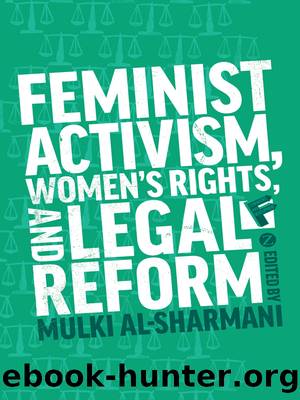Feminist Activism, Women's Rights, and Legal Reform by Mulki Al Sharmani

Author:Mulki Al Sharmani [Sharmani, Mulki Al]
Language: eng
Format: epub
Tags: Nonfiction, Reference & Language, Law, Comparative, Religion & Spirituality, Middle East Religions, Islam, Social & Cultural Studies, Social Science, Sociology
ISBN: 9781617977831
Publisher: The American University in Cairo Press
Published: 2017-10-20T04:00:00+00:00
Conclusion
This chapter has analysed the strategies used by feminists to demand a Uniform Family Code. It discussed why feminists focused on drafting an alternative unified code, and how they packaged the demand for the new law as a matter of social justice to fulfil the goals of addressing the inequality experienced by many women of different communities in Bangladesh, and of upholding nationalist ideals and principles of secularism as stated in the constitution. These strategies were chosen in the light of the role played by Islam in politics and the partisan nature of the civil society arena. However, these strategies failed to address the male resistance both within the dominant Muslim community and within other religious minority communities. Islamic groups challenged whether it was legitimate for the womenâs groups to propose reforms and played on the stateâs fear of being branded anti-Islamic. Men from minority communities feared the loss of identity and their right to religion, along with a possible loss of property if inheritance laws were reformed to allow women to acquire property. All of these factors led to the feministsâ failure to push through reforms for a uniform code.
Despite this failure, the campaign led to some positive changes for women. The debates triggered by the campaign efforts made women from minority communities more aware of their interests and the conflict that at times arises between oneâs gender and ethnic/religious identities. Slowly, the demand for reform is being raised by women within these communities in different forums. The most significant of these is the demand for a Hindu Marriage Act, which would require the registration of Hindu marriages (interviews with BMP member, 15 May 2009; BNWLA member, 25 September 2009). Some recent state policy documents from the Bangladesh government, and actions on the part of some of its institutions show a partial espousal of some of the proposals in the draft Uniform Family Code. For example, the National Womenâs Development Policy, which was proposed under the previous caretaker regime, includes a clause which states that women have full control over the assets they acquire. The policy left the option open to apply the clause to inherited property, which is in line with the proposed uniform code. This created a furore among the Islamic political parties and groups, but the womenâs groups came out strongly in favour of this policy. In addition, a recent High Court judgement ruled that people can have their school completion certificates issued with only their motherâs name stated as their guardian rather than their fatherâs, which also fits in with arguments put forward by the Uniform Family Code. It remains to be seen, though, how this process of piecemeal change will evolve, and what will be its long-term impacts.
Download
This site does not store any files on its server. We only index and link to content provided by other sites. Please contact the content providers to delete copyright contents if any and email us, we'll remove relevant links or contents immediately.
Cecilia; Or, Memoirs of an Heiress — Volume 1 by Fanny Burney(31332)
Cecilia; Or, Memoirs of an Heiress — Volume 3 by Fanny Burney(30934)
Cecilia; Or, Memoirs of an Heiress — Volume 2 by Fanny Burney(30889)
The Great Music City by Andrea Baker(21283)
We're Going to Need More Wine by Gabrielle Union(18072)
Bombshells: Glamour Girls of a Lifetime by Sullivan Steve(13108)
Pimp by Iceberg Slim(12931)
All the Missing Girls by Megan Miranda(12747)
Fifty Shades Freed by E L James(12451)
Norse Mythology by Gaiman Neil(11883)
Talking to Strangers by Malcolm Gladwell(11876)
Crazy Rich Asians by Kevin Kwan(8349)
Mindhunter: Inside the FBI's Elite Serial Crime Unit by John E. Douglas & Mark Olshaker(7833)
The Lost Art of Listening by Michael P. Nichols(6472)
Enlightenment Now: The Case for Reason, Science, Humanism, and Progress by Steven Pinker(6405)
Bad Blood by John Carreyrou(5768)
The Four Agreements by Don Miguel Ruiz(5510)
Weapons of Math Destruction by Cathy O'Neil(5036)
We Need to Talk by Celeste Headlee(4868)
